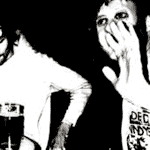
Husband and Knife
Welcome Back to the Nothingness of Your Life / An End
(Divorce; 2007 / 2008)
By Scott Reid | 23 October 2008
Brace yourselves: these two records from Halifax’s Husband & Knife are some capital-d depressing, third act of Requiem for a Dream-level shit. KC Spidle, the one-man “band” behind all this awful, finds endless inspiration from the darkest corners of lowlife-dom: the drug addicted, the destitute, the suicidal, the poets. No joke (literally), this is music tailor made for times so defined by the negative. Fitting, then, that it should arrive alongside the States’ current death-spiral into a supposed new age of fend-for-your-own-fucking-self! survivalism, a catastrophe so ripe for fear-mongering that insufferable douchebags like Glenn Beck can’t help but be ball-tickled into already promising bread lines (“What are we, Russia?!”). (Speaking of which, Stephen Harper—between photo-ops with terrified kittens—assures us Canada’s bubble is safe, but only because he’s heroically kept Stéphane Dion from riding our livelihoods like a flailing cowboy into oblivion, a la Major Kong atop the nuke in Dr. Strangelove.) And really, what better comfort than abnormally dark folk, crassly performed as only a Lou Reed and Black Flag disciple could? Don’t bother yelling “a job” at your screen, that’s a rhetorical question.
Both records offer stark contrast to Spidle’s other projects like the Tomlab-signed Dog Day, who had us fawning with last year’s Night Group. First, yeah, he’s their drummer so maybe we shouldn’t expect Husband & Knife to sound like a side-project, but the shift couldn’t be more extreme—as if he leapt from Dog Day’s half-way romantic indie rockosphere and hit the bottom hard, the compounded filth of his psyche first breaking the fall and then inspiring songs that wallow in their profound lows. Since downer-folk this down would sound of out place with a triumphant clatter backing him, the only company he invites into this misery—self-recorded on four-track, natch—is drummer Chik White, who does little to shake the stink of doom from closer “On the Streets.” It’s by conscious design very tough music to sit through, yet it’s compelling precisely because Spidle throws himself into the immense fog of black cloud so whole-heartedly; in turn he exhales aching and sparse melodies that recall early Hayden, or at least a young Hayden doing his most sinister Malkmus impression. Standouts “So Tired,” “Career Suicide,” and “Death Day” go off into grungier, nearly rock tangents, while “Had to Die,” “Rescue” and “Impact” slow the record to a gothic crawl, revealing just how trying an entire record of only acoustic guitar and minor-key catharting can be.
Pretty much all of that can also apply to Welcome Back‘s follow-up, An End, except a) the songwriting is stronger, and b) he’s moved from four-track to laptop, birthing actual arrangements that are wisely adopted as compositional tools first, decoration second. Opener “The Sea” stomps inches away from a full-out singalong, but it’s a false lead, an island of morose pop that hints where Spidle could go with this project if he ever tires of the dirge. But, as next track “Headless Army” hints, that’s certainly not the case here; all these songs, from the jarring “Dead Lovers” (go figure this guy’s romantic leads would be corpses), through the beautiful repetitious swells of “Job” and “Black Dog,” and even the greasy riffage of “Drug Poet,” retread and refine Welcome Back‘s folk noir aesthetic. Only “Free” embraces the most tedious parts of its predecessor, but as the closer it doesn’t derail the album so much as just end things on a disappointing note, which in a way seems like the only logical conclusion.
The one truly surprising part of all this is how Spidle is able to spin this Apocalypse into something genuinely positive. In a recent feature from Halifax weekly The Coast, writer Andrew Robinson pondered how “the darkness of his songs, combined with the way they celebrate negativity, is largely informed by his love for punk rock.” Spidle agreed: “I think negativity is a challenging thing [...] What I’ve always liked about punk is how it embraces the most shocking and negative subjects in such a way that you can celebrate it. If you listen to a Black Flag record, they deal with a lot of crazy shit like mental illness and suicide, but at the same time you’re listening to it, you feel empowered by it, and it makes you feel positive.”
So, basically, these shitty times are Husband & Knife’s golden dumpster, and he’s eager to celebrate and share the dive. If insufferable douches like Glenn Beck are right, we’ll all be joining him soon enough.





